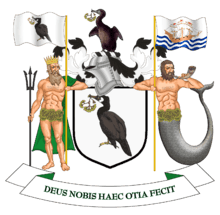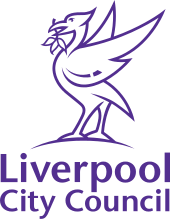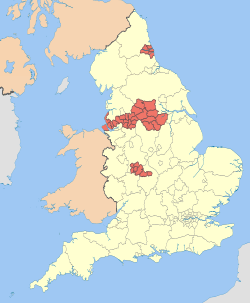Liverpool City Council
Coordinates: 53°24′25.9″N 2°59′30″W / 53.407194°N 2.99167°W
| Liverpool City Council | |
|---|---|
 | |
 | |
| Type | |
| Type | |
| Leadership | |
| Structure | |
| Seats | 90 |
 | |
Political groups |
|
Joint committees | Liverpool City Region Combined Authority |
| Elections | |
Last election | 7 May 2015 |
Next election | 2016 |
| Meeting place | |
 | |
|
Liverpool Town Hall Dale Street Liverpool L2 2DH | |
| Website | |
| liverpool.gov.uk | |
Liverpool City Council is the governing body for the city of Liverpool in Merseyside, England. It consists of 90 councillors, three for each of the city's 30 wards. The council is currently controlled by the Labour Party and is led by Mayor Joe Anderson. It is a constituent council of Liverpool City Region Combined Authority.[1]
History
Domain
Liverpool has been a town since 1207, when it was granted its first charter by King John. It has had a town corporation (the Corporation of Liverpool) since before the 19th century, and this was one of the corporations reformed by the Municipal Corporations Act 1835. The corporation created a police force in 1836.
Liverpool was granted city status in 1880. When local government was reformed in 1888 under the Local Government Act 1888 it was one of the cities to become a county borough, and thus independent of Lancashire. This situation persisted until 1974 with the Local Government Act 1972, when due to urban expansion and the accretion of a large metropolitan area, the city was made a metropolitan district of the metropolitan county of Merseyside. This saw the old corporation nomenclature abolished and the council reconstituted as Liverpool City Council.
In 1835 Liverpool expanded into the village of Everton and then the township of Kirkdale in the 1860s. In 1895 Wavertree, Walton and parts of Toxteth and West Derby were incorporated into the city. Fazakerley (1904) and Gateacre (1913) followed, then the rest of West Derby known as West Derby Rural in 1928 and finally Speke in 1932.
In 1986 the council of Merseyside was abolished and its functions devolved to its districts, but the county still legally exists. Liverpool has never been a district council under Lancashire County Council.
Liberal followed by Militant-dominated Labour
In the late 1970s the City was run by the Liberal Party under Sir Trevor Jones. As part of their plans, a cost-cutting exercise was drawn up, to reduce the council's costs by 25%. In 1979 the Conservative Party won the General Election. The new government intended to cut council spending but Liverpool City Council successfully negotiated an exception from this, on the grounds that they were already following government policy and cutting 25%.
During the 1980s, the Trotskyist Militant group gained control of Liverpool's Labour Party and the council, and attempted to challenge the national government on several issues including refusing to set a budget in 1985. The council then adopted a 'deficit budget' in which spending exceeded income, and causing a financial crisis. The leadership of the Labour Party was drawn into the controversy, culminating with Neil Kinnock's speech to the Party Conference in 1985, denouncing Liverpool City Council without explicitly naming it. Derek Hatton, councillor for Netherley ward and Deputy Leader of the Council, shouted "lies" at the platform, and Eric Heffer, MP for Liverpool Walton constituency, left the conference platform.[2]
The Labour Party ultimately succeeded in expelling members of Militant, and Hatton himself was expelled from the Labour Party in June 1986.[3]
Since 1990
- 1998 The Liberal Democrats win control of Liverpool City Council.
- 2003 Liverpool win the UK nomination of European Capital of Culture for 2008.
- 2004 Liverpool's waterfront and parts of the city centre are given World Heritage status.
- 2005 in November Lib Dem leader of the Council Mike Storey resigns after eight years following emails in which he was accused of plotting to try to engineer the departure of the Council's Chief Executive, Sir David Henshaw, who had already announced his intention to retire.
- 2005 Cllr Storey was replaced as leader by Warren Bradley. Sir David Henshaw was replaced as chief executive by Colin Hilton.
- 2005 Liverpool City Council issue a formal apology for the flooding of Capel Celyn, near Bala, North Wales. The community was destroyed and the land flooded to create Llyn Celyn in 1965. The reservoir was solely created to supply water to Liverpool and Wirral.
- 2006 Planning decisions and policies of the Council threaten the World Heritage status. Council faces cutting £29million from its budget – much of it from the money earmarked for Capital of Culture.
- 2007 Mathew Street festival – large free outdoor festival, controversially cancelled at last minute due to health and safety concerns
- 2008 Council awarded 1 star by Audit Commission and as such the worst performing council in the country.
- 2008 Jason Harborow, Chief Executive of Culture Company, charged with delivering Capital of Culture, quits with a large cash payout after clashes with Cllr Warren Bradley and Cllr Mike Storey.
- 2008 Liberal Democrats lose overall control of city on 1 May in local elections, however a midnight defection of an Independent (Former Labour) Councillor gives them a majority of 1.
- 2008 Green Party take second seat in St Michael's ward, becoming a recognisable "group" on the council.
- 2009 The council announces a major shake up of middle management.[4]
- 2010 The Labour party win control of the council for the first time in 12 years, with Joe Anderson becoming the new council leader[5]
- 2011 The Labour Party's Jake Morrison aged 18 defeats Lord Mike Storey after 38 years service[6]
- 2012 The Labour Party's Joe Anderson is elected as the first Mayor for Liverpool
The Lord Mayor
The Lord Mayor of Liverpool is the first citizen and chosen representative of the city, acting as a focal point for the community as well as promoting the city. The Lord Mayor's main responsibilities includes meeting delegates from twinned cities, chairing council meetings and representing the city. The Lord Mayor of Liverpool is always a serving councillor, elected by the full council at its Annual General Meeting held each May, and serve for a term of one year: the current Lord Mayor is Councillor Roz Gladden.
For list of past Lord Mayors of the city see Lord Mayors of Liverpool.
Council Wards
Liverpool is split into 30 separate wards for elections. These are the wards since the 2004 local elections.[7]
 |
Between 1953–1973 the wards of Liverpool City Council were Abercromby, Aighburth, Allerton, Anfield, Arundel, Breckfield, Broadgreen, Central, Childwall, Church, Clubmoor, County, Croxteth, Dingle, Dovecot, Everton, Fairfield, Fazakerley, Gillmoss, Granby, Kensington, Low Hill, Melrose, Netherfield, Old Swan, Picton, Pirrie, Princess Park, St Domingo, St James, St Mary's, St Michaels, Smithdown, Speke, Sandhills, Tuebrook, Vauxhall, Warbreck, Westminster, Woolton.
Political makeup
Elections are usually by thirds, in three of every four years. 2004 saw new boundaries and a reduction in the number of councillors from 99 to 90, so all seats were contested.
In March 2007, Labour gained a seat from the Liberal Democrats in a by-election in Speke Garston ward. In the May 2007 council elections, the Liberal Democrats lost 4 seats to Labour, leaving the council make-up as Liberal Democrats 51, Labour 35, Liberals 3 and Greens 1.
Labour then won a second by-election in Warbreck ward in September 2007.
In May 2010, the Labour Party, led by Joe Anderson, gained control of the council for the first time in 12 years.[8] In May 2011, Labour increased their majority on the Council making 11 gains.
At the May 2012 elections, Labour won 27 seats and the Liberal Democrats, Green Party and Liberals 1 each. This made the composition of the Council 72 Labour (after one Councillor became an independent), 9 Liberal Democrat (after a defection to the Labour party), 3 Liberal, 2 green and 2 independents.
In the May 2014 elections, the Labour party won 27 seats, the Green party won 2 seats, and the Liberal party won 1 seat. This made the composition of the Council for 2014/15: 78 Labour, 4 Green, 3 Liberal Democrat, 3 Liberal, and 2 independent.
| Year | Labour | Lib Dems | Liberal | Green | Other | Refs | ||||
|---|---|---|---|---|---|---|---|---|---|---|
| 2016 | 80 | 4 | 2 | 4 | – | |||||
| 2015 | 81 | 2 | 2 | 4 | 1 | [9] | ||||
| 2014 | 78 | 3 | 3 | 4 | 2 | [10] | ||||
| 2012 | 72 | 10 | 3 | 2 | 1 | [11] | ||||
| 2011 | 62 | 22 | – | 2 | 4 | [12] | ||||
| 2010 | 48 | 37 | 3 | 2 | – | [13] | ||||
| 2008 | 39 | 45 | 3 | 2 | 1 | [14] | ||||
| 2007 | 35 | 51 | 3 | 1 | 0 | [15] | ||||
| 2006 | 30 | 56 | 3 | 1 | – | [16] | ||||
| 2004 | 27 | 60 | 3 | 0 | – | [17] | ||||
| 2003 | 31 | 63 | 3 | 0 | 2 | [18] | ||||
Leaders
In the 19th and early 20th Century the council was run by the Conservatives, whose policies were responsible for Liverpool leading the way in many areas of social reform, for example the provision of the first council-housing in Europe. Liverpool was one of the last cities in the UK in which the Labour Party gained control, this not occurring until 1955.
The council has switched numerous times between Liberal Democrats control and Labour control since its reconstitution in 1974, with two periods of no overall control.[19]
- 1890: Archibald Salvidge
- 1929: Thomas White
- 1938: Alfred Shennan
- 1955: Jack Braddock
- 1961: Maxwell Entwistle
- 1963: Jack Braddock
- 1967: Harold Steward
- 1972: Bill Sefton
Leaders and Control (1974–2012)
| Name | Years | Control | ||
|---|---|---|---|---|
| Cyril Carr | 1974–1975 | No Overall Control | ||
| Bill Smyth | 1975–1976 | |||
| John Hamilton | 1976–1978 | |||
| Eddie Roderick | 1978 (May – Jun) | |||
| John Hamilton | 1978–1979 | |||
| Trevor Jones | 1979–1983 | |||
| John Hamilton | 1983–1987 | Labour | ||
| Tony Byrne | 1986–1987 | |||
| Trevor Jones | 1987 (Mar – May) | Liberal | ||
| Harry Rimmer | 1987 (May – Oct) | Labour | ||
| Keva Coombes | 1987–1990 | |||
| Harry Rimmer | 1990–1992 | |||
| 1992–1996 | No Overall Control | |||
| Frank Prendergast | 1996–1998 | Labour | ||
| Mike Storey | 1998–2005 | Liberal Democrats | ||
| Warren Bradley | 2005–2010 | |||
| Joe Anderson | 2010–2012 | Labour | ||
Directly Elected Mayors (2012– present)
| Name | Political Party | Start of Term | End of Term | |
|---|---|---|---|---|
| Joe Anderson | Labour | 4 May 2012 | Incumbent | |
Sites
- Municipal Buildings, Liverpool Admin Centre.
- Liverpool Town Hall Ceremonial HQ.
- Calderstones House Recreation and Open Spaces Departments.
References
- ↑ "Proposal to establish a combined authority for Greater Merseyside" (PDF). Department for Communities and Local Government. November 2013. Retrieved 10 December 2013.
- ↑ James Naughtie "Labour in Bournemouth: Kinnock rounds on left's militants", The Guardian, 2 October 1985
- ↑ "1986: Labour expels Militant Hatton", BBC On This Day, 12 June
- ↑ Waddington, Marc (30 January 2009). "Liverpool Council: We'll cut back on big money". Liverpool Echo. Retrieved 30 January 2009.
- ↑ "Labour sweeps to power in Liverpool after 12 years of Lib Dem rule". Liverpool Echo. Retrieved 7 May 2010.
- ↑ "Teenage Labour candidate beats ex-Lib Dem Leader". BBC News. 6 May 2011. Retrieved 6 May 2011.
- ↑ "Ward profiles". Liverpool City Council. Archived from the original on 1 March 2006.
- ↑ "Labour win Liverpool Council for first time in 12 years". BBC News. 7 May 2010. Retrieved 7 May 2010.
- ↑ "Political Composition – 2014/2015". Retrieved 14 September 2015.
- ↑ "Political Composition – 2014/2015". bbc.co.uk. BBC. Retrieved 23 September 2014.
- ↑ "Liverpool Local elections 2012". bbc.co.uk. BBC. Retrieved 23 September 2014.
- ↑ "Liverpool Local elections 2011". bbc.co.uk. BBC. Retrieved 23 September 2014.
- ↑ "Liverpool Local elections 2010". bbc.co.uk. BBC. Retrieved 23 September 2014.
- ↑ "Liverpool Local elections 2008". bbc.co.uk. BBC. Retrieved 23 September 2014.
- ↑ "Liverpool Local elections 2007". bbc.co.uk. BBC. Retrieved 23 September 2014.
- ↑ "Liverpool Local elections 2006". bbc.co.uk. BBC. Retrieved 23 September 2014.
- ↑ "Liverpool Local elections 2004". bbc.co.uk. BBC. Retrieved 23 September 2014.
- ↑ "Liverpool Local elections 2003". bbc.co.uk. BBC. Retrieved 23 September 2014.
- ↑ "BBC NEWS, Election 2006, Liverpool". BBC News. Retrieved 2010-05-11.
External links
| Wikinews has related news: Liverpool |
- Liverpool City Council
- Ward profile
- Capital of Culture 2008
- Liberal Democrats in Liverpool
- The Labour party in Liverpool
- The Liberal Party in Liverpool
- The Green Party in Liverpool

